- Home
- Jessie Haas
Westminster West Page 10
Westminster West Read online
Page 10
Hoofbeats in the darkness. Bright stopped ten feet away, with a loud, frightened, challenging snort.
“Bright! It’s me.”
He hesitated. Firelight gleamed on the round curves of his back, and his nostrils were huge black caverns. His little ears flicked back and forward.
Then he took a step toward her. Sue slipped under the rail and put the reins around his neck. He took the bit, staring past her at the flames arching high over the sheep barn roof. The stench of burning wool nearly made Sue vomit. Thank God the sheep were out. Only the fleeces were burning.
“No, David! You can’t let her!”
Father had seen her run, had understood. He was at the gate now, taking down the last bar. Mother, behind him, reached for his arm. He paid no attention.
“Bring him through, Susie!” Bright’s front feet seemed nailed to the ground. Father’s voice rang out. “Bright! Hup!”
Bright trembled, then danced forward, crowding against Sue, almost dragging her along. He hopped the bars and stopped again, eyes bulging as he stared at the flaming barns. Sue remembered: A horse will run back to a burning stable. But Bright lived mostly in the pasture; he shuddered and danced away from the sight of the barn in flames.
“You’ll be all right?” Father’s hand was on the bridle, his other hand making a stirrup. Sue put her foot into his hand, and he threw her up. Bright’s back sank and surged, but Father held him firm. Sue reached up to wind the reins around her hands and bury her fingers deep in Bright’s long mane.
“Holden’s, then Campbell’s—tell them to bring force pumps. Then Drislane and Hall. Hang on!”
He let the bridle go, and Bright leaped away in a spray of gravel. His muscles bunched, his hoofbeats were one long drum roll, and Sue had no grip on his back. She was carried along on his airstream, her legs slipping farther and farther back. She pulled herself forward, closed her legs around him. Straight as an arrow up the deeply shadowed road gallopingallopingalloping …
Like an explosion, he shied to the right. Sue felt herself flying loose. Only one leg was still around him, stretching like a piece of elastic, out into thin air. She was coming off …
No. Her fingers hurt, but they were deep in his mane, and she pulled herself straight on his round, slippery back as he galloped up the little rise. The hill slowed him but not enough. At the turn she would fall.
“Bright!” she gasped. “Whoa!” To shorten the reins, she had to free her hands from his tangling mane. One, quickly the other. She wrapped the reins once more around her fists and pressed them hard to the muscle of his neck. “Bright, whoa!”
He didn’t whoa, but the hard-driving gallop hesitated. A float and a lift came into it. She could sit to it now and free her hands, check and release, check and release, and by the time he reached the main road he was trotting. Sue turned him downhill.
Now canter again. In the moonlight Sue could see the Holdens’ barn, almost a quarter mile away. Bright’s hooves sounded like gunfire on the road. She could hear his great, gasping breaths. In the sky an orange light seemed to reach from behind, like a huge cupped hand trying to catch them.
They rounded the corner, passed the barn, and clattered up to the dark house. For just a second it felt strange and wrong to disturb the quiet. Would she be able to yell? Bright stopped in two hard bounces, snorting loudly and Sue fought for breath.
An upstairs window crashed up. Jerome Holden leaned out, the sash pushing his nightcap askew. “Fire!” Sue gasped. “The barns!”
“Firebug?”
“Yes,” Sue said. Three fires at once—it could only be the firebug. Bright whirled beneath her, and she slipped and clutched his mane. The sky above the hill glowed; sparks rose. What was happening? “Force pumps!” she shouted to the empty window, and Mrs. Holden’s head popped out.
“Susie Gorham, as I live and breathe! Hang on to that black devil!”
Sue found herself laughing as she cantered down the driveway. Devil? There was never a better horse than Bright. He’d come to her out of the night pasture; he carried her safely.… Her heart swelled. “Oh, Bright!”
He swooped around the corner onto the Westminster West road. Now they were coming to the burned-out Campbell barn. That would scare him in the moonlight. Sue laced her fingers deep in his mane. But Bright cantered past without swerving, and Sue turned him up the driveway of the pillared mansion.
“Wake up! Fire!” She didn’t have enough breath, Bright wouldn’t stand. “At Gorham’s—fire. Aunt Emma! Uncle Fred!”
A back window flew up. “Susie!” It was Minnie.
“The barns are on fire!” Sue screamed. “Force pumps!” Lights were coming on all through the long house. Bright whirled on the gravel.
Sue let him gallop around the corner, past the Holden house, all awake now. Ahead on the road, horses were running, Mr. Holden and someone else racing to the fire. Bright caught them as they started to climb the hill, then thundered past. Past their own road, glowing like a fireplace; he would have turned there, but Sue kept him running. His breath whistled, his mane stung her eyes, and Sue could feel him slow and strain as the steep, heartbreakingly long hill drained the strength from him.
They crested the hill between the two giant hayfields. Here the moon shone white and serene, and the road was flat. Bright’s gallop was slower and not as steady, as Sue turned him up the drive to the Drislanes’.
Moonlight shone full on the sheltered front porch and on the timbers of the new barn. Sue rode up close to the house. “Fire! Fire at Gorham’s!” Loud enough? No one was coming.…
“Saints above, it’s Susie Gorham!”
At once Sue turned Bright down the driveway. One look at the sky would answer all questions.
Bright’s sides heaved, and his back was no longer slippery. Sue’s legs and skirt were welded to him with sweat. She turned down the road toward the Hall house, white and silent in the moonlight. She needed to brace her hands against his neck now. Her legs seemed to have no strength left.
Up the driveway—no yell left either. She drew Bright close to the front door and reached for the rope that rang the dinner bell. It clanged. Bright shuddered away, and Sue let him go down the driveway. Behind her voices. “Who’s th—Oh.” A shout, and feet thumping through the house. “Fire down at Gorham’s! Wake up!”
The glow in the sky was enormous. Sue rode slowly toward it. The house must be afire, too. Was Clare out? Surely they all were safe?
But she couldn’t hurry now. Bright jigged for a moment, then dropped to a fast, jerky walk. He trotted again, briefly, when the Halls galloped past, but slowed without any signal from Sue. His part was done, and tenderly, taking care of himself and Sue, Bright minced down the hill and turned in at the farm road.
A great flickering light filled the road before them. Bright hesitated and then went on. Sue clung, leaning forward on his hot, sticky neck. Down the little hill and around the corner toward the roaring flames.
The heat struck her in the face. Bright stopped in his tracks, and it was like standing in front of the range on baking day. The heat came in waves, making a wind of its own. The house was still standing, but the roof glowed red—no, that was just reflection. Someone was pumping water on the slates, someone was up there watching, but the house was untouched.
Where the sheep barn had stood, a great bonfire roared. The big barn was just a shell, red and flaming inside and out. The huge timbers stood out dark, like a skeleton.
As Sue sat watching, the roof collapsed. There was a crash, shouts. Father was moving people back, directing people with pumps and buckets and a gathering tank on a wagon. The people looked tiny against the huge fires, like toy soldiers, and Father was like a toy captain, but all alive, with a crisp look of command and a spring to his step.
Once they all had moved to where he wanted them, Father turned, looking up the road. For a moment he stood there with his back to the inferno. Just as Sue understood and moved Bright forward into the light, he saw her.
>
His whole frame relaxed, and he came running. Passing one of the young Holden boys, who had been made to stand back out of the way, he clapped him on the arm and brought him along. “Whoa, Bright. Young fellow, hang on to this horse’s bridle.”
Father’s face was red with reflected firelight, and tears glittered on his cheeks, catching the flames’ brightness. He reached up for her. “Come on, Susie.”
Sue tried to slide off. Her skirt stuck to Bright’s back, and she had to free it with her hands before she could let herself down into Father’s arms.
He pulled her close, deep, into the strongest hug she’d ever felt, holding her whole weight for a moment and pressing his cheek against her hair. “Good girl. Good girl.” Then he let her down.
Her feet touched the ground, and her knees buckled. She held on to his arm and made them straighten.
“Son,” Father said to the Holden boy, “I want you to walk this horse cool. Keep him close to the fire, so he doesn’t take a chill.” He looked into the boy’s face. “Now, this is your job. I’m counting on you to keep this horse from getting sick.”
The boy’s eyes were wide. He nodded solemnly and turned away, leading Bright in a small circle within the fire’s glow.
“Your mother’s in the house, Susie. With the sheep barn down, we think it’s safe.”
Sue heard his voice as if from a distance. How strange, the sheep barn being down was a good thing. They went together up the walk, where the firelight shone on the lavender and southernwood. The shouts and the loud flames seemed far away.
“Go on in. Can you make it by yourself?”
Sue glanced up at him. He was looking toward his barns, so interested, so aware that his face seemed almost glad. He dropped Sue’s arm and turned away, and Sue walked in through the open kitchen door.
“Sue! Thank goodness!” Mother seized her by the shoulders with fingers that bit deep and looked searchingly into her face. Mother’s eyes were wild and bloodshot, and her face was streaked diagonally with soot.
Sue burst out laughing.
“Young lady, don’t you dare get hysterical!” Mother almost pushed her into the rocker. She snatched the shawl off the back of the chair and tucked it around Sue’s shoulders, then turned to the sink to pump a cup full of water.
Laughter, or something, still shook Sue’s body. Her mind felt calm. She felt like herself. But shudder after shudder ran through her, and when she took the cup, she shook so hard that a big slop of water landed on her lap.
Mother’s hand closed around the cup, but Mother’s hand shook, too. They stared at their hands, apparently wrestling for the cup.
Then Mother began to laugh. She laughed until her tears washed two clean paths down her cheeks. She brushed the tears away, making such a grotesque pattern that Sue laughed even harder and spilled the rest of the water on the floor.
“Oh, my goodness!” Mother gasped as their laughter died. “Oh! At least no one came in and saw us!” She got off her knees, stiffly, and went back to the pump for more water.
Sue looked around the kitchen. Sooty puddles stood on the scrubbed boards. A chair was tipped over. In the middle of the room were two bushel baskets half full of china and towels, ready to go if the house caught fire. Yet the table was still set for breakfast, with plates and cups turned upside down and all the silverware in order, exactly the way Sue had set it herself the evening before she got sick.
A great crash came from outside. Mother stepped to the door and stood looking for a few minutes. Then she came back, bringing the cup half full of water. “The south wall’s down. That’s a mercy.”
“Was the boy still walking Bright?”
“Having trouble, but he still had hold of him.”
Sue took a sip of water. “We should close the door,” she said. “Keep the smoke out.”
When the door was shut, it was suddenly quiet inside the kitchen. Despite the mess and the smell of smoke, it seemed like a sanctuary again, the women’s room. Mother turned from the door, and Sue asked, quietly, the question she’d been afraid to ask till now: “Where is Clare?”
Mother met Sue’s eyes. A flush came up under the streaks of soot, and her mouth set in a long, downcurved, trembling line. Sue’s heart sank for a moment. Then Mother said, “Clare … is in bed.”
22
CLICK! WENT the kitchen clock, as sharply and suddenly as a trap springing shut. But it was only time passing, second by second as always.
“Has she—was she—” Sue stopped, closed her eyes, and took a long breath, swallowing the questions.
Mother’s voice was so low Sue could hardly hear. “When we didn’t see her, we went looking. Your father went into the barn.” Mother shuddered and pressed her hands to her face. “But Ed—Ed said, ‘Look in the house,’ and he found her.”
“Is she—” No, there were no questions she could ask. Clare was not hurt. She had not overworked. What she had done was claim her place again. That moment in the hallway was suddenly more vivid to Sue than it had been while it was happening. Herself thundering down the stairs and Clare looking at her, not out at the fire but up at her sister with a wide, mesmerized stare.
“I’ve done wrong by Clare,” Mother said, staring straight ahead. “Let her think she was delicate, let her get ideas. I should have realized long ago. I’ve done very wrong by both of you.”
She sat at the table, so suddenly it was like a collapse, and put her head on her arms, right on top of a place setting.
Sue pulled herself out of the chair. Her legs trembled, and her thighs felt disastrously weak, as if the bones were gone. She crossed the room and put an arm around Mother’s shoulders. Mother’s back was unyielding, like the shell of a turtle. Sue felt a piercing sadness. She had wanted Mother to see, but she hadn’t wanted it to hurt like this.
She kissed the back of Mother’s head, the smoky, tangled, slept-on hair. Then she went to Clare’s room.
There was no lamp lit in the back bedroom, but the moonlight poured in across the bed, spread with Clare’s lacy white afghan, across Clare in her nightgown. Her face had an exalted look, as if here, where not even the light of the fires penetrated, she participated in the excitement with all of them.
“Susie! Was it the firebug?”
The question left Sue staring blankly. She could smell herself, reeking of horse sweat and smoke in this clean, still room. She had meant to scream at Clare; it had felt like a scream inside her. How can you do this to them? Do you know Father risked his life to find you?
But suddenly that seemed impossible. What Clare had done was no different from what Sue had done.
Yes, it is different, some part of her asserted.
Not that different. Lie in bed through a season of work. Go to bed while the barns burned down. A difference, but where was the line? She could not scream at Clare because she herself was guilty. Mother of course had not screamed either, and it was worse for Mother. Sue had known for a month now that she was doing something wrong. Mother had never suspected it of herself until just this moment.
“Yes, Clare,” she said. “It was the firebug. I’d better go see what’s happening.”
Father was just going out the kitchen door, carrying a kettle, and Mother was taking cups out of the cupboard. “Check in those baskets, Sue,” she said, not turning. “How many people are out there?”
Sue dropped on her knees beside the baskets. “What is he doing?”
“He’s making coffee! No sense heating up the cookstove, he said, when we’ve got all that fire outside. You’d think this happened every day. I’ll never understand him!”
I feel that way about everyone, Sue thought, and at the same time she felt as if she understood them all perfectly.
The world had gone gray and grainy, and she couldn’t tell if it was tiredness or smoke. Her hands kept taking things out of the basket, as if they had minds of their own.
Mother bent over her to take the cups. “Of all things!” she said. “I was going to save
my dishcloth!”
They emptied out one basket and put in all the cups, the old tin ones, the agateware, and the thick white mugs they drank from every day. “I’ll take them,” Mother said, but Sue kept hold of one handle, and they carried the basket together. The boneless feeling had spread up Sue’s back, down her legs. How strange that she could keep on moving anyway, that she could balance and heft the basket and open the door with her free hand.
The scene outside was strangely peaceful. The sheep barn seemed like the large, friendly bonfire at the Grange corn roast. The big barn made a bigger blaze, but it seemed to know its place and didn’t threaten to spread. And the chicken house fire was the perfect size for cooking.
Men stood watchfully, pumps and buckets ready, but the shouting was over. Just friendly, excited talk now. “… thought I was a goner when that timber went,” Sue heard, and, “By golly, about the time my beard started to smoking I figured I’d get out!”
It must be just like the war, she thought, like the aftermath of battle.
Near the big barn stood the generals: Father, Fred Campbell, Patrick Drislane. Drislane did not usually belong because he was an Irishman, a Catholic, but his barn had been burned, too, making him at least the equal of Jerome Holden, who so far had lost nothing. A little space was allowed to exist between them and the rest. They stood in a close group, their shoulders and their hatbrims at an angle of authority.
The water in the kettle began to smell like coffee. A cloud of smoke drifted over, drifted back. In the east, above the low ridge, the sky was beginning to lighten.
The generals turned slowly, as one man, and wandered toward the coffee kettle. “… hire a detective,” Father was saying.
“Now why do we need some Boston detective?” Jerome Holden asked passionately. “We know the ground, we know every gol—everybody in town! Why can’t we handle it ourselves?”
“We haven’t made much of a job of it so far,” Campbell commented. At this early hour, shrugged into an old frock coat, he didn’t look any richer or more important than anyone else.

 Chase
Chase The Sixth Sense
The Sixth Sense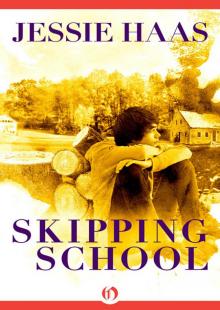 Skipping School
Skipping School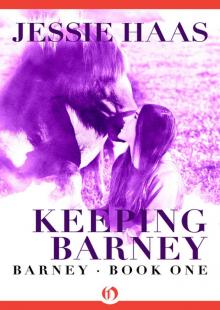 Keeping Barney
Keeping Barney Unbroken
Unbroken Westminster West
Westminster West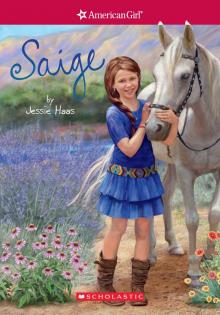 Saige
Saige Beware the Mare
Beware the Mare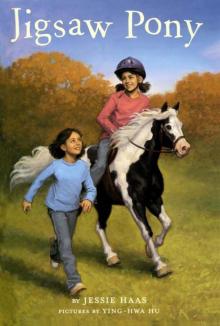 Jigsaw Pony
Jigsaw Pony Rescue
Rescue Saige Paints the Sky
Saige Paints the Sky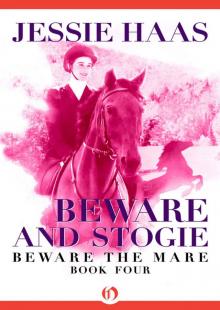 Beware and Stogie
Beware and Stogie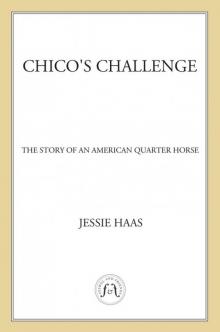 Chico's Challenge
Chico's Challenge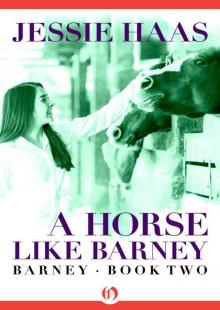 A Horse like Barney
A Horse like Barney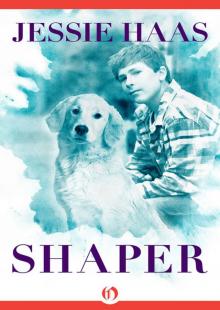 Shaper
Shaper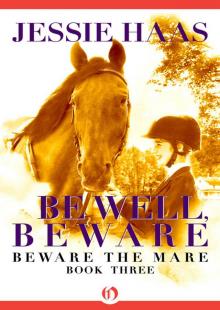 Be Well, Beware
Be Well, Beware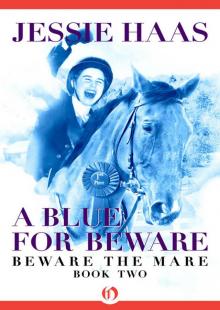 A Blue for Beware
A Blue for Beware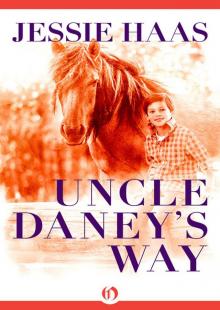 Uncle Daney's Way
Uncle Daney's Way